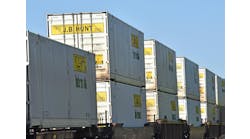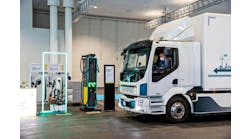The University of Michigan Transportation Research Institute (UMTRI) and less-than-truckload (LTL) carrier Con-way Freight have announced the results of a year-long field test of an integrated system of crash warning technologies designed to enhance the safety of commercial trucks. Program funding was provided by the Research and Innovative Technology Administration (RITA) Intelligent Transportation Systems Joint Program Office of the U.S. Department of Transportation.
Con-way Freight supported the study by providing 10 Class-8 commercial freight tractors that were equipped with the Integrated Vehicle-Based Safety System (IVBSS) technology. Over the course of the 10-month study, which began in February 2009, 18 Con-way Freight drivers operated the trucks out of the company’s Detroit service center as part of its normal business operations, logging 601,844 miles; 22,724 trips; and generating 13,678 hours of data.
While the test vehicles were driven, data acquisition systems recorded driver actions and responses to the integrated warning system. UMTRI researchers then analyzed the data to study the effect that the integrated warning system had on driver acceptance and changes in driver behavior.
Key findings from the study include:
• The majority of drivers perceived that the integrated crash warning system would increase driver safety, and it made them more aware of the traffic environment around their vehicle and their position in the lane.
• Seven drivers reported the integrated system prevented them from potentially having a crash.
• Fifteen out of 18 drivers said they prefer a truck equipped with the integrated safety system and would recommend that their employers purchase such a system.
• In terms of satisfaction, drivers rated warnings for lane departures the highest, and second highest in terms of perceived usefulness .
• The integrated crash warning system had a statistically significant effect helping drivers maintain lane positions closer to the center.
• Overall, drivers responded more quickly to potential rear-end crash scenarios with the system
Based on its experience with the study, Con-way Freight chose to invest in the new technologies for all new replacement units added to the fleet this year—more than 1,300 Freightliner Cascadia Class 8 tractors representing an investment of some $100 million, explains Bob Petrancosta, the company’s vice president of safety.
“The insight we gained from the IVBSS study confirmed the feedback we got from our drivers—these technologies are ready for prime time and are effective at helping drivers avoid the most common instances of crashes involving commercial trucks,” he notes.
The 1,300 new tractors were each equipped with an integrated suite of “detect, alert and respond” systems which provide for rollover stability, front collision warning with radar-based adaptive cruise control, and lane departure warning. The safety technologies for the new tractors, all of which have gone into service, represent a cumulative investment of about $5 million.
Additional program partners for the IVBSS commercial-truck research include Eaton Corp., Takata Corp., International Truck and Engine Corp. and Battelle. The cooperative agreement with the U.S. Department of Transportation is administered by National Highway Traffic Safety Administration (NHTSA) with assistance from the Federal Motor Carrier Safety Administration (FMCSA).


